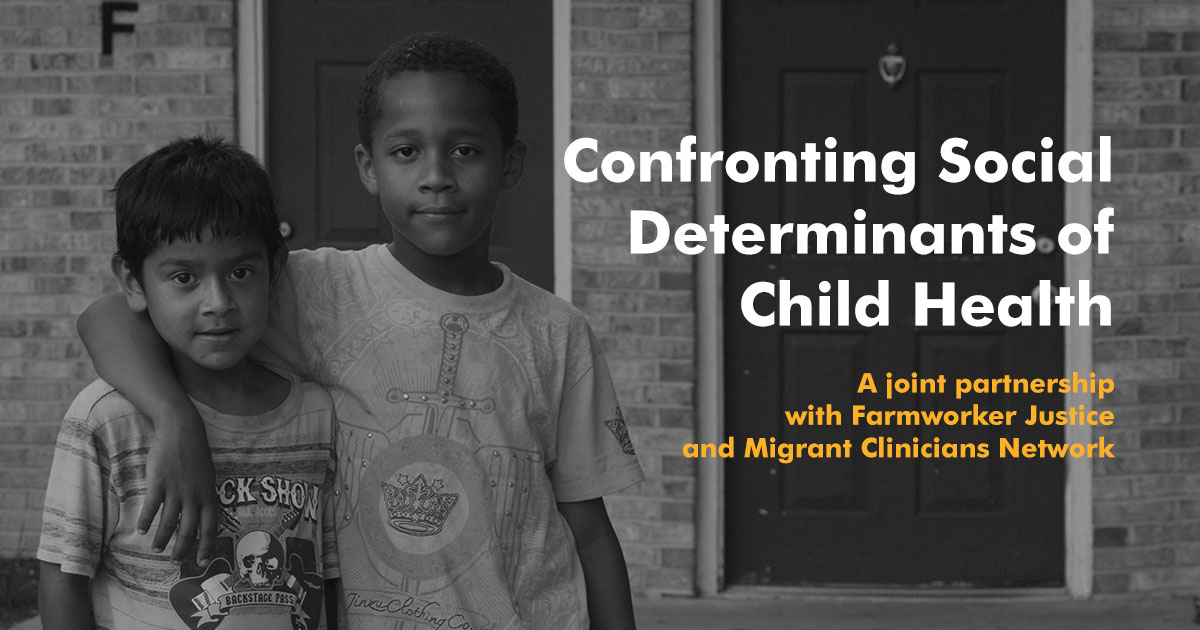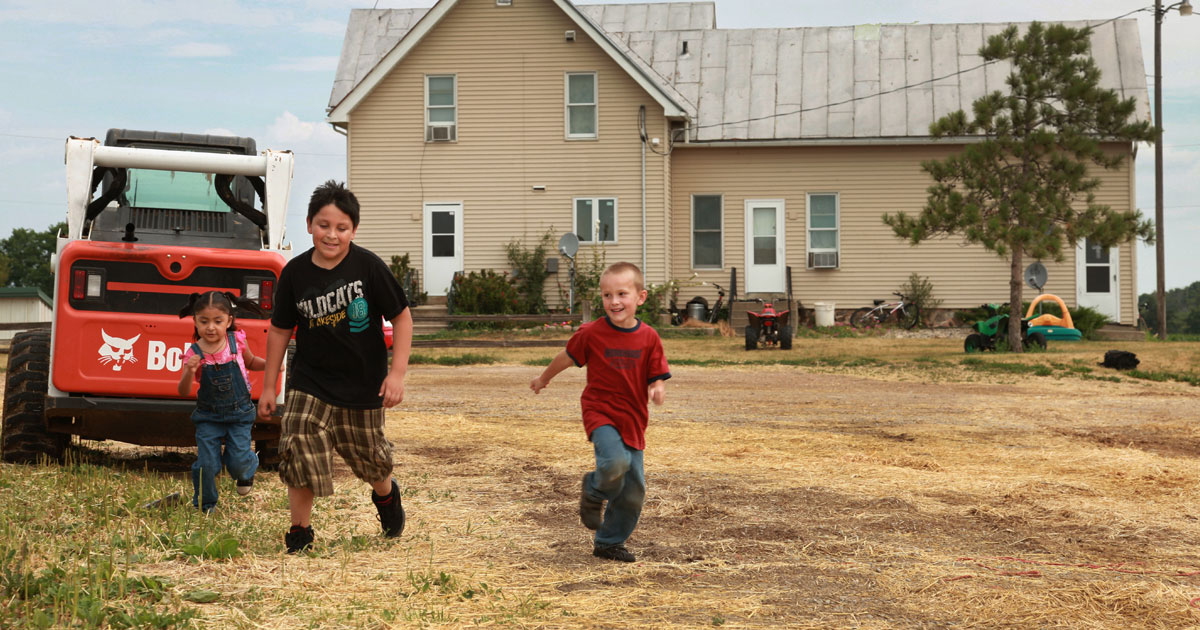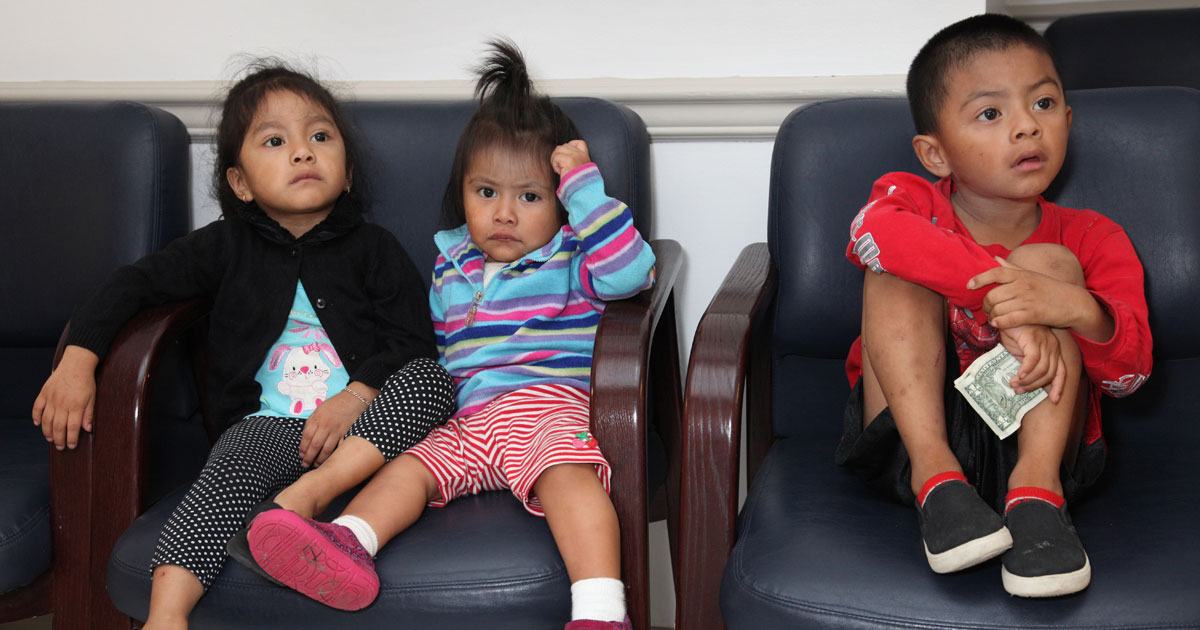Confronting Social Determinants of Child Health
 Photograph by Earl Dotter
Photograph by Earl Dotter
Children with greater social needs are at higher risk for poor health outcomes. Such factors in a child’s home and local community, called “social determinants of health,” like access to healthy food, a clean local environment, steady housing, and even a family’s access to child care, can influence a child’s health and development. Among agricultural worker communities, parents’ very low incomes and long working hours, language and cultural barriers, environmental and occupational exposures, and the need to move for work may increase the efforts needed to assure a healthy childhood. Yet, several programs are using promising models to address some of the social determinants of child health by leveraging community programs already in place and increasing the linkages between community partners to better serve the community -- and improve children’s health. In partnership with Farmworker Justice, Migrant Clinicians Network looks into the lives of some of the community members involved in these initiatives to see how the programs work.
Protecting Children While Parents Work
When a newly relocated strawberry field worker and mother of four first came to Sonia Gutierrez McCormack’s Nipomo, California office, she broke down in tears. “She informed me that she could not find child care and due to that she could not continue to work,” McCormack, Family Child Care Coordinator for Community Action Partnership of San Luis Obispo Co., Inc., recalled. The worker’s two-year-old, with an individualized plan through the county for speech delays, required special attention, and because the parents could not find a safe place for her to go during the working hours, the mother decided to stop working. “The family chose to live off of what little they were able to save for the winter when work is scarce, so that the mother could stay home and try to find care.” The mother told McCormack that she had been turned down by three different childcare providers. She was also two months pregnant.
“This lack of childcare for this family forced them to weigh out the realistic benefits for their family due to mother's entire check going towards paying a babysitter and food,” McCormack said. And this family’s situation isn’t unique. Thousands of agricultural workers move to a new location for work -- and struggle to get the services they left behind. “Our families pick up and leave what was once a familiar place to them and their children [to seek] better opportunities in life, always starting over, mostly without supporting family or friends to trust,” McCormack noted. Luckily, with McCormack’s help, the family was enrolled in several programs for which they qualified, including care for the youngest child and a new diagnosis of postpartum depression for the mother. With these services, the mother was able to work until eight months pregnant, and they are now a healthy family of seven.
“This lack of childcare for this family forced them to weigh out the realistic benefits for their family due to mother's entire check going towards paying a babysitter and food,”
A lack of childcare isn’t just a logistics problem for parents. For growers, it can mean a serious worker concern. “In labor-intensive agriculture, we know we need our employees -- it’s a two-way street,” noted Frank Gasperini, President and CEO of the National Council of Agricultural Employers and the President and CEO of the Agricultural Safety and Health Council of America. McCormack agrees: “They need their employees happy and healthy equally as the employees need them.” When local employers, childhood education programs like Migrant Head Start, and parents come together, however, each can bring an important perspective to the table -- and health and safety advocates may find that many of each group’s needs are the same.

Photograph by Earl Dotter
Protecting Children While Parents Work, a partnership between MCN and National Children's Center for Rural and Agricultural Health and Safety, seeks to open the dialogue and establish common ground among employers and employees. From there, local industry leaders, parents, and Migrant Head Start programs can better understand where goals and needs overlap, and work together to establish programs to make sure children have a safe place to go while parents are working.
“Some of our members… [reported] issues of their workers having problems finding suitable childcare. That’s a problem both for the parent and for the employers, because, in the end, people miss work if they can’t find childcare,” Gasperini noted. When children are given a safe place to stay while parents are at work, it frees up both parents to potentially work, and it may increase worker satisfaction. “It [can] almost double your workforce because both mom and dad can work… and it assures your employees are loyal,” because when employers show an interest in their concerns, parents take notice, Gasperini said.
Such a partnership can mean opening up dialogue between two forces that may historically been at odds. “It can be hard because there’s been a lot of distrust on both sides. We get a lot of people who think that employers are bad, and a lot of employers who think these people will assume we don’t care,” Gasperini said.
“By providing childcare for families we have in turn created partnerships in and throughout our community -- and hope and trust,” McCormack said. “That is worth more than most can comprehend.”
For more information about Protecting Children and MCN’s Environmental and Occupational Health program, contact Juliana Simmons at jsimmons@migrantclinician.org or 512-579-4538.

Photograph by Earl Dotter
Promoting Child Access to Health Care
Sofia’s* teeth hurt but she hadn’t yet been to a dentist. A four-year-old daughter of a mobile agricultural worker, her family had recently arrived in Florida. Her mother met Jimena, a Family Services Worker with the local Migrant and Seasonal Head Start. Jimena immediately linked Sofia’s family with the Community Health Center in their area, which has a pediatric dental clinic within the health center. After their initial appointments and follow-up appointments, Sofia’s whole family -- including siblings and parents -- made appointments for dental care, which had been put off due to a number of barriers including cost, transportation concerns, and frequent moves for work. Jimena assisted the family in attaining the appointments and answering questions about the available services.
Children in the care of Migrant and Seasonal Head Start providers often have unmet health care needs. To offset their health concerns, Head Start’s Family Services Workers provide high-quality health, mental health, nutrition, parent engagement, and social services to Migrant and Seasonal Head Start infants, toddlers, and preschool children, and their families. They build partnerships with families to assist them in identifying their own goals, strengths, needed services, and support system. Family Services Workers meet with families to understand their children’s needs and connect them to community resources, including health centers. In the case of Sofia’s family, their connection with Jimena didn’t just mean a quick resolution to Sofia’s acute pain, but also resulted in a greater connection of the whole family to the full suite of health services that are available to them at the local Community Health Center.
To strengthen the bridge that Family Services Workers create from agricultural worker children and their families to local health centers, Farmworker Justice (FJ) and the National Migrant and Seasonal Head Start Collaboration Office (NMSHSCO) recently developed a Health Partnership Learning Network. Currently in its pilot phase, the Learning Network seeks to recognize the important role that Family Services Workers provide and strengthen the collaboration between a community’s Migrant and Seasonal Head Start site and Community Health Center. Through leadership training, shared learning, and individual technical assistance, the Health Partnership Learning Network aims to encourage the participation of Family Services Workers and parents in health center Boards of Directors and advisory councils.
“Family Services Workers are leaders in their community who have unique insight into the lives of each community’s agricultural worker families. Their participation in their local health center’s governance bodies promotes broader community access to health services by ensuring that services are responsive to the community members’ needs,” said Alexis Guild, Senior Health Policy Analyst at Farmworker Justice.
There are currently three Migrant and Seasonal Head Start grantee participants in the Health Partnership Learning Network. FJ and NMSHSCO plan to expand the Learning Network in the coming year.
For more information about the Health Partnership Learning Network or to connect with a Migrant and Seasonal Head Start site near you, contact Alexis Guild at aguild@farmworkerjustice.org.
*Sofia’s story is a fictional account based on stories from the field. Both Sofia and Jimena are fictional names.



